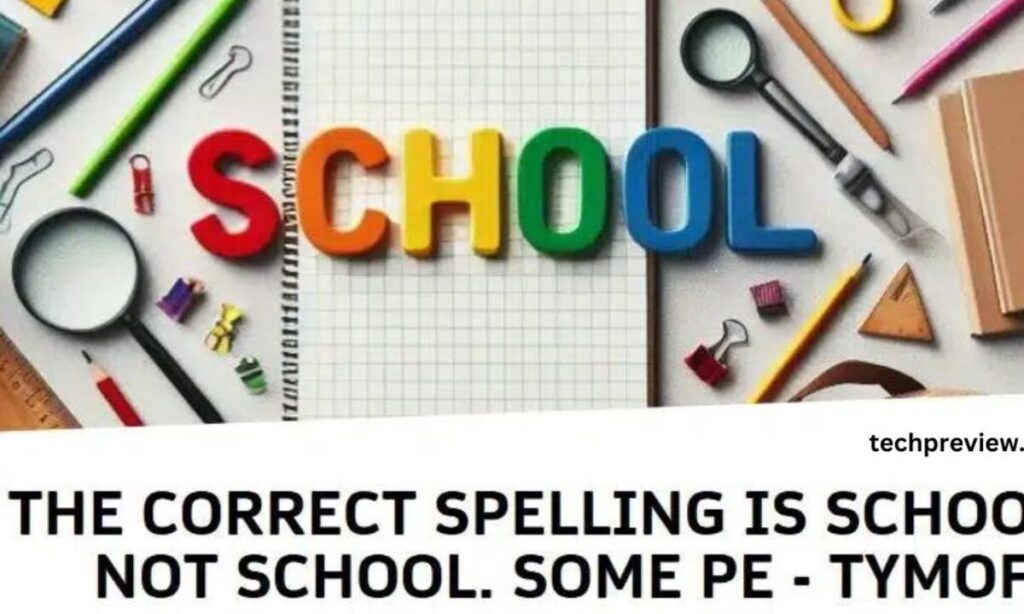
xr:d:DAF8jRLuvSI:184,j:3956831849538581006,t:24022310
While the phrase “there’s no shame in making mistakes” holds true, proper spelling is an essential skill for clear communication. Today, we address a common misspelling: “school” vs. “scohol.”
This article tackles the correct spelling of “school” and delves deeper into common spelling pitfalls. We’ll explore:
- Why “school” is spelled the way it is: We’ll explore the word’s origin and historical development.
- Common misspelling patterns: We’ll identify patterns that lead to mistakes like “scohol” and offer tips to avoid them.
- Strategies for improving spelling: We’ll provide practical techniques to solidify your spelling skills.
- The importance of proper spelling in different contexts: We’ll discuss how spelling impacts communication in professional settings, education, and everyday life.
Why It’s “School” Not “Scohol”: A Look at the Word’s Origins
The word “school” comes from the Old French “escole,” which itself stemmed from the Latin “schola.” Both terms referred to a place of learning or leisure. Interestingly, the “sch” sound in “school” has its roots in the Greek “σχολή” (scholē), meaning “leisure” or “rest.” Over time, the meaning evolved to encompass a place of education.
The “oo” sound in “school” can be a source of confusion. It’s not uncommon to see the misspelling “scohol,” likely due to the pronunciation. However, the “oo” sound is derived from the Old French “o,” which often represented a long “oo” vowel.
Here’s a helpful mnemonic to remember the spelling: “Students Cool in Halls of OOl” (school).
Common Misspelling Patterns and How to Avoid Them
The “scohol” misspelling highlights a common pattern: confusing sounds with their corresponding spellings. Let’s explore some common culprits:
- Silent letters: Words like “knight” (silent “k”) and “debt” (silent “b”) can be tricky. Pay attention to the pronunciation and etymology of the word.
- Double letters: “Happened” vs. “hapened,” “committee” vs. “commitee.” Double consonants often strengthen the preceding vowel sound. Look for repetition within the word.
- Homophones: Words that sound alike but have different spellings and meanings (“there” vs. “their,” “too” vs. “to”). Context is key here. Utilize a dictionary or thesaurus to differentiate.
Strategies to Sharpen Your Spelling Skills
Here are some practical tips to improve your spelling:
- Read extensively: Exposure to correctly spelled words helps build your internal dictionary.
- Engage with spelling games and puzzles: Fun and interactive ways to practice.
- Use a spellchecker, but don’t rely solely on it: Proofread carefully to catch errors the spellchecker might miss.
- Maintain a personal spelling list: Identify commonly misspelled words and write them down for regular review.
- Use mnemonic devices: Create memory aids to remember tricky spellings, like the “school” mnemonic mentioned earlier.
The Importance of Proper Spelling
While informal communication might allow for occasional typos, proper spelling carries significant weight in various contexts:
- Professional settings: Resumes, cover letters, and emails with typos create a negative impression. Proofread meticulously before sending.
- Academic writing: Essays and assignments with spelling errors can negatively impact your grades. Utilize resources like writing centers and proofreading tools.
- Clear communication: Misspelled words can lead to misunderstandings, especially in formal communication.
Beyond these specific situations, proper spelling reflects attention to detail, professionalism, and a commitment to clear communication.
Expanding Our Spelling Knowledge: A Deep Dive into Spelling Rules
Building upon the foundation laid in the previous section, let’s delve deeper into specific spelling rules that can help you navigate the intricacies of the English language. Here, we’ll explore vowel sounds, consonant blends, plurals, and other essential concepts:
Vowel Sounds and Spellings:
The English language is notorious for its inconsistency in how vowels are pronounced. While there are basic short and long vowel sounds, the “magic e” rule and numerous exceptions can create confusion. Here’s a breakdown:
- Short Vowels: The most common spellings for short vowel sounds include:
- a: “cat,” “hat,” “map”
- e: “bed,” “hen,” “men”
- i: “pig,” “pin,” “rip”
- o: “dog,” “hop,” “hot”
- u: “cup,” “fun,” “sun”
- Long Vowels: Long vowel sounds often have multiple spellings:
- a: “make,” “name,” “rain” (also “ei” as in “veil”)
- e: “meet,” “see,” “theme” (also “ie” as in “believe”)
- i: “bike,” “fine,” “kite” (also “igh” as in “high”)
- o: “boat,” “go,” “home” (also “oa” as in “coat”)
- u: “cute,” “juice,” “music” (also “ue” as in “true”)
Magic “e”: The silent “e” at the end of a word often changes the preceding vowel sound from short to long. Examples include “cake” (short “a”) vs. “cape” (long “a”). However, there are exceptions like “move” and “love.”
Understanding Consonant Blends and Digraphs:
Consonant blends are two or more consonants appearing together with a single sound. Common examples include:
- Blends: “fr-” (friend), “str-” (strong), “tr-” (train)
- Digraphs: These are two-letter combinations representing a single sound, such as “sh-” (ship), “th-” (thin), “wh-” (what).
The Maze of Plurals:
Forming plurals can be a challenge, especially with irregular plurals like “foot” (feet), “tooth” (teeth), and “child” (children). However, there are general rules to follow:
- Regular Plurals: Most nouns add “-s” to form the plural (“cat” becomes “cats”).
- Nouns Ending in “-s,” “-sh,” “-ch,” “-x,” or “-z”: These nouns usually add “-es” (“bus” becomes “buses”).
- Nouns Ending in “-y” Preceded by a Consonant: Change the “y” to “i” and add “-es” (“baby” becomes “babies”).
- Irregular Plurals: Learn these exceptions through memorization or using a dictionary.
Beyond the Basics: Exploring Advanced Concepts
The world of spelling goes beyond these fundamental rules. Here are some additional concepts to consider:
- Homophones and Heteronyms: These are words that sound alike (homophones) or have the same spelling but different meanings (heteronyms). Examples include “there/their/they’re” (homophones) and “bow” (a weapon vs. to bend at the waist) (heteronyms). Understanding context is crucial.
- Silent Letters: As mentioned earlier, silent letters can be tricky. Knowing their historical context can be helpful.
- Foreign Words: Words borrowed from other languages might retain their original spellings (“ballet,” “déjà vu”).
Remember: Exceptions abound in English spelling. Utilize a dictionary as a reliable reference.
Resources for Lifelong Spelling Improvement
Here are some valuable resources to support your spelling journey:
- Dictionaries: Consult online or physical dictionaries to check spellings, pronunciations, and definitions.
- Thesauruses: These can help you find synonyms with correct spellings when unsure of a word.
- Online Spelling Resources: Websites and apps offer interactive spelling quizzes, games, and exercises.
- Books and Workbooks: Several publications focus on improving spelling at various levels.
- Proofreading Tools: Many word processing software programs have built-in spellcheckers. However, use them as a guide, not a crutch.
Conclusion: Beyond “School” – Embracing Lifelong Learning
While this article focused on the correct spelling of “school” and avoiding “scohol,” the core message extends beyond a single word. Developing strong spelling skills is a lifelong pursuit that benefits communication in all aspects of life. By embracing the strategies mentioned above, you can refine your spelling and become a more confident communicator.
Remember, even the most skilled spellers make mistakes occasionally. The key is to identify your weaknesses, practice regularly, and utilize the resources available. Now, go forth and conquer the world of spelling – one correctly spelled word at a time!





